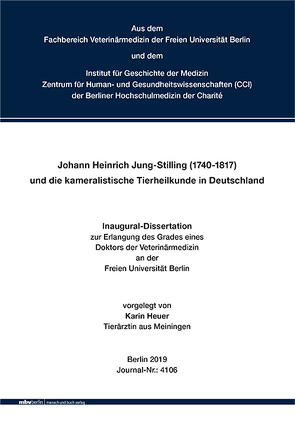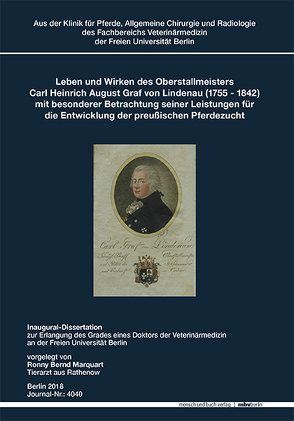
"Johann Heinrich Jung-Stilling (1740-1817) and cameralistic veterinary medicine in germany"
This ergobiographical study examines an exceptional personality in the history of veterinary medicine: the pietistic author and cameralist Johann Heinrich Jung, also known as Stilling. It begins with an account of Jung`s life, notably his path to becoming a professor of cameralism in Kaiserslautern, Heidelberg and Marburg. The second section addresses the Pietism of the time, political absolutism in fragmented Germany, the 18th century Enlihgtenment movement, and the cameral sciences. Jung`s literary writing is placed in the context. His autobiography is discussed, as are his pietistic devotional books and his specialist works, which are of particular interest here: these are Jung`s writings on cameralism and his medical, veterinary and economic works. The primary focus is on the treatment of veterinary medicine within the framework of his occupation as a professor of cameral sciences.
With regard to his life history, the early death of his mother is noteworthy and is elaborated upon. This circumstance caused Jung to have the inusual experience of growing up almost completely isolated from his peers. His father involved him – a sensitive child – completely in his strictly religious everday life. This left biographical traces and had a distinct influence on his pietistic faith. The concept of providence is a common theme througthout his life and made him a proponent of a deeply religious determinism. During his studies of medicine (1770-1772) in Strasbourg, he found his way into circles of Enlightenment thinkers – with Johann Wolfgang von Goethe being particulary worthy of mention here – which resulted in his literary breakthrough. Inspired by this freethinking movement, there was a phase in which he permitted himself less dogmatic, more progressive and non-pietistic thoughts. Encouraged by Goethe to write and publish his literary works, he did so up until old age. Jung was already well known during his lifetime. His religiously grounded determinism and his inability to deal with a criticism hampered not only his further literay development, but also his production of impartial subjectspecific and scientific work: there was a virtually irreconcilable contradiction between, on the one hand, his belief in providence and, on the other hand, rationally founded research abilities and innovativebess. As a professor of cameral sciences, Jung gathered all the knowledge available about each subject with extraordinary diligence and conscientiousness, an wrote his own textbooks based on this information. However, he succeeded only to a limited extent in producing independent and scientifically durable results that went beyond compilations. This study focuses particulary on Jung`s veterinary works, and a clear dependence on other authors was detected. The word-for-word similarities between writings by Jung and the content of textbooks by Johann Christian Polycarp Erxleben and Louis Vitet are striking.
Given his fame, there is much academic discussion of Jung: Oskar Walzel described Jung as a medical amateur; Wilhelm Stieda criticised his inadequate scientific approach and his insufficient knowledge of contemporary economic literature; Heinrich Webler rebuked him for his superficiality; and Wilhelm Roscher reproached him for his eclecticism and his fondness for state absolutism. Maria Schwarz` academic “attempt at rehabilitation” failed because it was influenced by her family connections to Jung and, above all, tendencies, which clearly show her work was published during the period of National Socialism.
Andre Wakefield`s work »The Disordered Police State: German Cameralism as Science and Practice« contains the most vehement critism of the cameral sciences and its practitioners. He chides the German cameralists, including Jung, for their shallow theory construction and their paltry results. He criticises cameralism for being a fraudulent system that, instead of aligning the interests of the “Kammer” and the state, actually concealed the facts of the prince`s fiscal and income policy.2147 At the same time, however, Wakefield draws attention to the enormous range of disciplines that were covered by the cameral sciences, though he also stresses in his study the low standard of German cameralism. The extensive writings of the proponents of economics according to Adam Smith and the scientific theorists of mercantilism in France had a considerably broader foundation – despite their scientific and theoretical fixation on the tasks of the state and confinement to the economic interests of the territorical princely houses – and took account of trade and technical production.
This dissertation explores the critical elements in Jung`s works and discusses them without “throwing the baby out with the bath water” a criticism that can be levelled against Wakefield.
Aktualisiert: 2022-12-31
> findR *

Life and Work of the crown equerry earl Carl Heinrich August of Lindenau (1755 – 1842) with special consideration of his achievements for the development of the Prussian horse breeding
The thesis describes the life and work of earl Carl Heinrich August of Lindenau as crown equerry of Prussia. The first part is focused on his life, written in a chronological order. Although the biography is concentrated on private aspects, the sources are extremly uncommon and so there is not much known about the private life of Carl Heinrich August of Lindenau. The second part is concentrated on his work as crown equerry of Prussia and the meaning of his work for the prussian horse breeding.
Lindenau was born in 1755 in Machern, nearby Leipzig. His school education was very well compared to the time he lived. He studied in Switzerland and took part in the austrian army. Later he joined the prussian army, ordered by King Friedrich Wilhelm II., to become crown equerry. According to this moment, Lindenau reformed the prussian horse breeding profoundly. He inspected the royal prussian horses and selected all with hereditary defect. Under his command, the stud farm in Trakehnen was reorganized to become an important role for the horse breeding in Prussia. Even though he is the founder of the Friedrich-Wilhelm-Stud Farm nearby Berlin, which he chosen to breed main stallions. Lindenau wrote the Landgestütreglement in 1787, a regulation including strict rules for horse breeding. These rules were translated in three languages to become a wide meaning. Equally he decided each year the breeding planning for the main stallions on the Friedrich-Wilhelm-Stud Farm personally.
Lindenau inaugurated the veterinary academy in Berlin in 1790 and nominated the first teaching staff. Under his order, the teachers been sent to France, Switzerland and Saxony to learn more about veterinary medicine. The curriculum was improved constantly by him.
In 1798, he resigned out of the active prussian army duty.
Lindenau was forced to change the horse breeding in 1806, because Prussia lost the war against France under the command of Napoléon. At first, he had to close the Friedrich-Wilhelm-Stud Farm. Secondly, in East Prussia he decimated the number of horses extremely. At least, the stud farm in West Prussia was shut down. All these orders were made by himself. Two years later he asked for his dismissal as prussian crown equerry.
As Major he joined the liberation war against Napoléon in 1813. After he became a general lieutnant in 1817, Lindenau finally passed out of the army in 1820 and retired. Until his death in 1842 he lived in Brandenburg on his manor in Bahrensdorf, near Beeskow.
Aktualisiert: 2019-12-31
> findR *
MEHR ANZEIGEN
Bücher zum Thema veterinary history
Sie suchen ein Buch über veterinary history? Bei Buch findr finden Sie eine große Auswahl Bücher zum
Thema veterinary history. Entdecken Sie neue Bücher oder Klassiker für Sie selbst oder zum Verschenken. Buch findr
hat zahlreiche Bücher zum Thema veterinary history im Sortiment. Nehmen Sie sich Zeit zum Stöbern und finden Sie das
passende Buch für Ihr Lesevergnügen. Stöbern Sie durch unser Angebot und finden Sie aus unserer großen Auswahl das
Buch, das Ihnen zusagt. Bei Buch findr finden Sie Romane, Ratgeber, wissenschaftliche und populärwissenschaftliche
Bücher uvm. Bestellen Sie Ihr Buch zum Thema veterinary history einfach online und lassen Sie es sich bequem nach
Hause schicken. Wir wünschen Ihnen schöne und entspannte Lesemomente mit Ihrem Buch.
veterinary history - Große Auswahl Bücher bei Buch findr
Bei uns finden Sie Bücher beliebter Autoren, Neuerscheinungen, Bestseller genauso wie alte Schätze. Bücher zum
Thema veterinary history, die Ihre Fantasie anregen und Bücher, die Sie weiterbilden und Ihnen wissenschaftliche
Fakten vermitteln. Ganz nach Ihrem Geschmack ist das passende Buch für Sie dabei. Finden Sie eine große Auswahl
Bücher verschiedenster Genres, Verlage, Autoren bei Buchfindr:
Sie haben viele Möglichkeiten bei Buch findr die passenden Bücher für Ihr Lesevergnügen zu entdecken. Nutzen Sie
unsere Suchfunktionen, um zu stöbern und für Sie interessante Bücher in den unterschiedlichen Genres und Kategorien
zu finden. Unter veterinary history und weitere Themen und Kategorien finden Sie schnell und einfach eine Auflistung
thematisch passender Bücher. Probieren Sie es aus, legen Sie jetzt los! Ihrem Lesevergnügen steht nichts im Wege.
Nutzen Sie die Vorteile Ihre Bücher online zu kaufen und bekommen Sie die bestellten Bücher schnell und bequem
zugestellt. Nehmen Sie sich die Zeit, online die Bücher Ihrer Wahl anzulesen, Buchempfehlungen und Rezensionen zu
studieren, Informationen zu Autoren zu lesen. Viel Spaß beim Lesen wünscht Ihnen das Team von Buchfindr.

